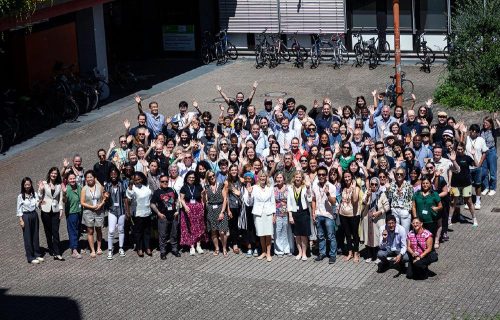Soviet and Post-Soviet Politics and Society: Most recent titles published in the acclaimed series.
- In "Russia’s Recognition of the Independence of Abkhazia and South Ossetia" Nikoloz Samkharadze looks at the Russian Federation’s official recognition of the independence of Abkhazia and South Ossetia in August 2008, which has since undermined both overall political stability in the South Caucasus in general and future prospects for Georgia’s development in particular.
- In "Optimizing Higher Education in Russia" David Mandel examines the impact of higher education reform on the situation of Russian university teachers and the collective efforts of some teachers, a small minority, to organize themselves into an independent union to defend their professional interests and their vision of higher education. Apart from the intrinsic interest of the subject, Mandel offers valuable insights into the nature of the Russian state as well as the state of "civil society”.
- With "Three Revolutions: Mobilization and Change in Contemporary Ukraine II" we present the second part of a multi-volume project on the Ukrainian revolutions of 1990, 2004, and 2013-2014. The volume focuses on the recollections, analyses, and evaluations of activists and observers of those events.
- The volume "Religion, Expression, and Patriotism in Russia", edited by Sanna Turoma, Kaarina Aitamurto, and Slobodanka Vladiv-Glover, addresses the politicization of private spheres of life in Russia that began with a series of new laws on religion, sexuality, and culture in the 2010s. Subsequently, political activism and radical grassroots movements embroiled many Russians in controversy and polarized public opinion alike. This volume presents seven case studies that explore the politics of religion and culture in contemporary Russia.
- After the collapse of the USSR, the former Soviet states have taken different paths. While many of them have struggled with serious economic problems or have become only questionably democratic, Georgia’s sociopolitical development has become a relatively successful post-Soviet transformation story. “Public Policy and Politics in Georgia”, edited by Tima T. Moldogaziev, Gene A. Brewer, and J. Edward Kellough, strives to offer a deeper understanding of Georgia that is useful for other transition and developing states. Many of the good governance implications of the research contributions collected in this volume are highly relevant to the entire Caucasus region and other post-communist countries.
- In "Geopolitical Imagination" Mikhail Suslov discusses contemporary Russian geopolitical culture. Specifically, he analyzes concepts such as "Eurasianism," "Holy Russia," "Russian Civilization," "Russia as a Continent," "Novorossia," and others and shows that these concepts achieved an unprecedented rise in Russian public debates and tended to overshadow other political and domestic discussions.
- Reformers had high hopes that the end of communism in Eastern Europe and the former Soviet Union would lead to significant improvements in legal institutions and the role of law in public administration. However, the cumulative experience of 25 years of legal change since communism has been mixed, marked by successes and failures, progress and regression. "Legal Change in Post-Communist States"—written by a team of sociologists of law—examines the nuances of this process and sets out to explain them.
- Russia has changed dramatically since the beginning of this decade. “Russian Voices on Post-Crimea Russia”, edited by Maria Lipman, presents a unique collection of articles by Russian scholars and experts that originally appeared in Russian in the journal Counterpoint. Authors include Yulia Bederova, Andrey Desnitsky, Maria Eismont, Aleksandr Gorbachev, Tatiana Nefedova, Ella Paneyakh, Sergey Parkhomenko, Nikolay Petrov, Kirill Rogov, Sergey Sergeev, Ekaterina Sokiryanskaya, Andrey Soldatov, Svetlana Solodovnik, Anna Tolstova, Aleksandr Verkhovsky, and Natalia Zubarevich.
Über ibidem-Verlag
Der ibidem-Verlag ist ein international aufgestellter Fachbuchverlag für Wissenschaftsliteratur mit Sitz in Deutschland. Wir bieten ein breites Spektrum aktueller und zeitloser Fachtitel, vornehmlich aus sozial- und geisteswissenschaftlichen Disziplinen. In diesen Fachgebieten pflegen wir derzeit neben mehreren Zeitschriften 62 wissenschaftliche Reihen. Besuchen Sie uns auf www.ibidem.eu.
Firmenkontakt und Herausgeber der Meldung:
ibidem-Verlag
Melchiorstraße 15
70439 Stuttgart
Telefon: +49 (711) 9807954
Telefax: +49 (711) 8001889
http://www.ibidemverlag.de/
Ansprechpartner:
Valerie Lange
Presse und PR
Telefon: +49 (511) 2622200
Fax: +49 (511) 2622201
E-Mail: vl@ibidem.eu
Presse und PR
Telefon: +49 (511) 2622200
Fax: +49 (511) 2622201
E-Mail: vl@ibidem.eu
Weiterführende Links
Für die oben stehende Pressemitteilung ist allein der jeweils angegebene Herausgeber (siehe Firmenkontakt oben) verantwortlich. Dieser ist in der Regel auch Urheber des Pressetextes, sowie der angehängten Bild-, Ton-, Video-, Medien- und Informationsmaterialien. Die United News Network GmbH übernimmt keine Haftung für die Korrektheit oder Vollständigkeit der dargestellten Meldung. Auch bei Übertragungsfehlern oder anderen Störungen haftet sie nur im Fall von Vorsatz oder grober Fahrlässigkeit. Die Nutzung von hier archivierten Informationen zur Eigeninformation und redaktionellen Weiterverarbeitung ist in der Regel kostenfrei. Bitte klären Sie vor einer Weiterverwendung urheberrechtliche Fragen mit dem angegebenen Herausgeber. Eine systematische Speicherung dieser Daten sowie die Verwendung auch von Teilen dieses Datenbankwerks sind nur mit schriftlicher Genehmigung durch die United News Network GmbH gestattet.
![]()




